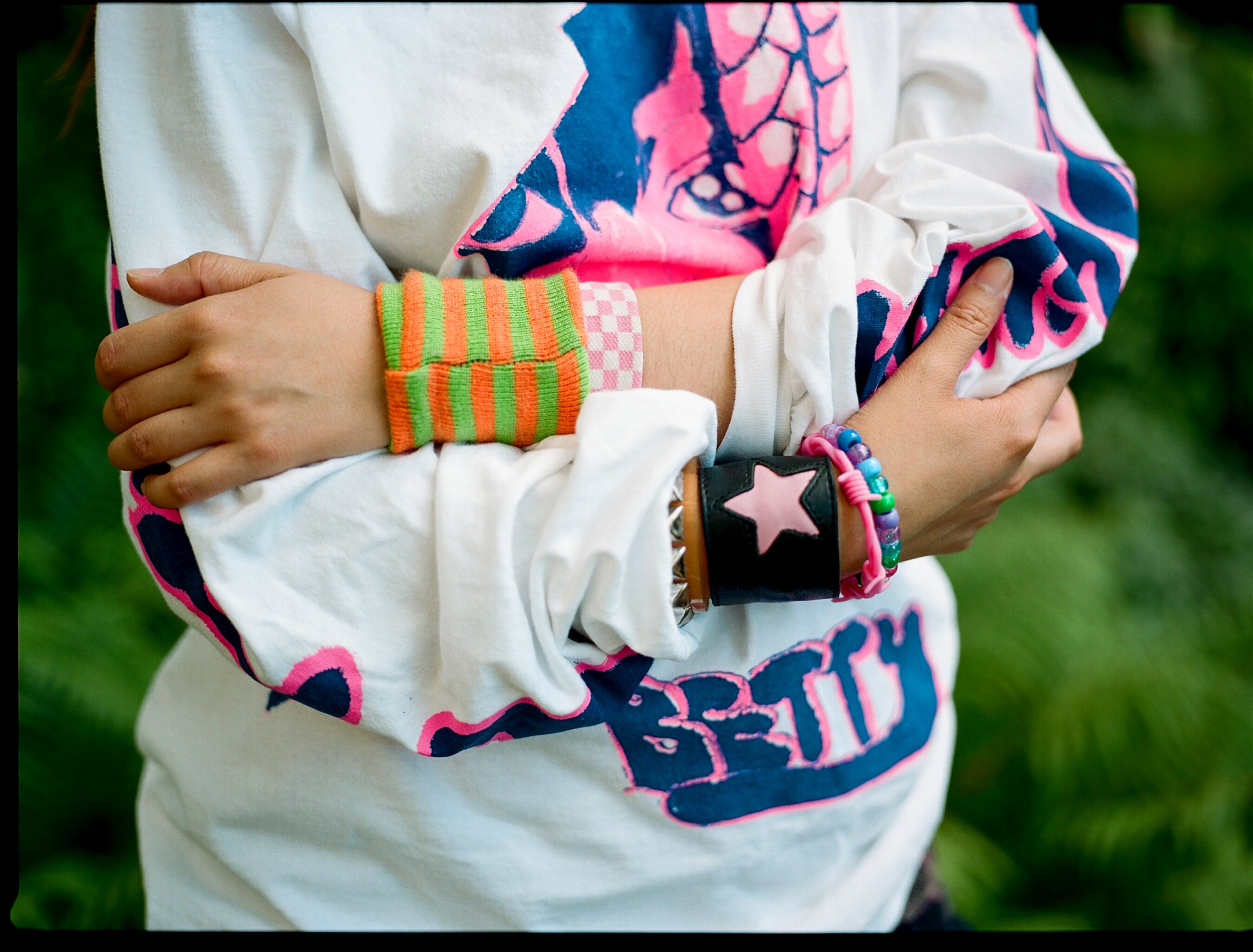In celebration of tonight’s season finale of Betty, we’ve teamed up with HBO to showcase a real-life group of skaters and artists—Sonya Sombreuil, Danielle Melendez, Sage Adams, Briana King, and Manon Macasaet—to hear more about their relationship with skating, their ties to the NYC skate community, and what Betty means to them. Filmed during the pandemic, Betty season 2 speaks to themes of community, self-expression, modern romance, gentrification, and navigating life as a familiar city is thrown into disarray.
To better understand the world Betty represents, and showcase this season’s Come Tees collab, we talked with a real-life group of skaters and artists—Sonya Sombreuil, Danielle Melendez, Sage Adams, Briana King, and Manon Macasaet—about their relationship with skating, their ties to the NYC skate community, and what Betty means to them.
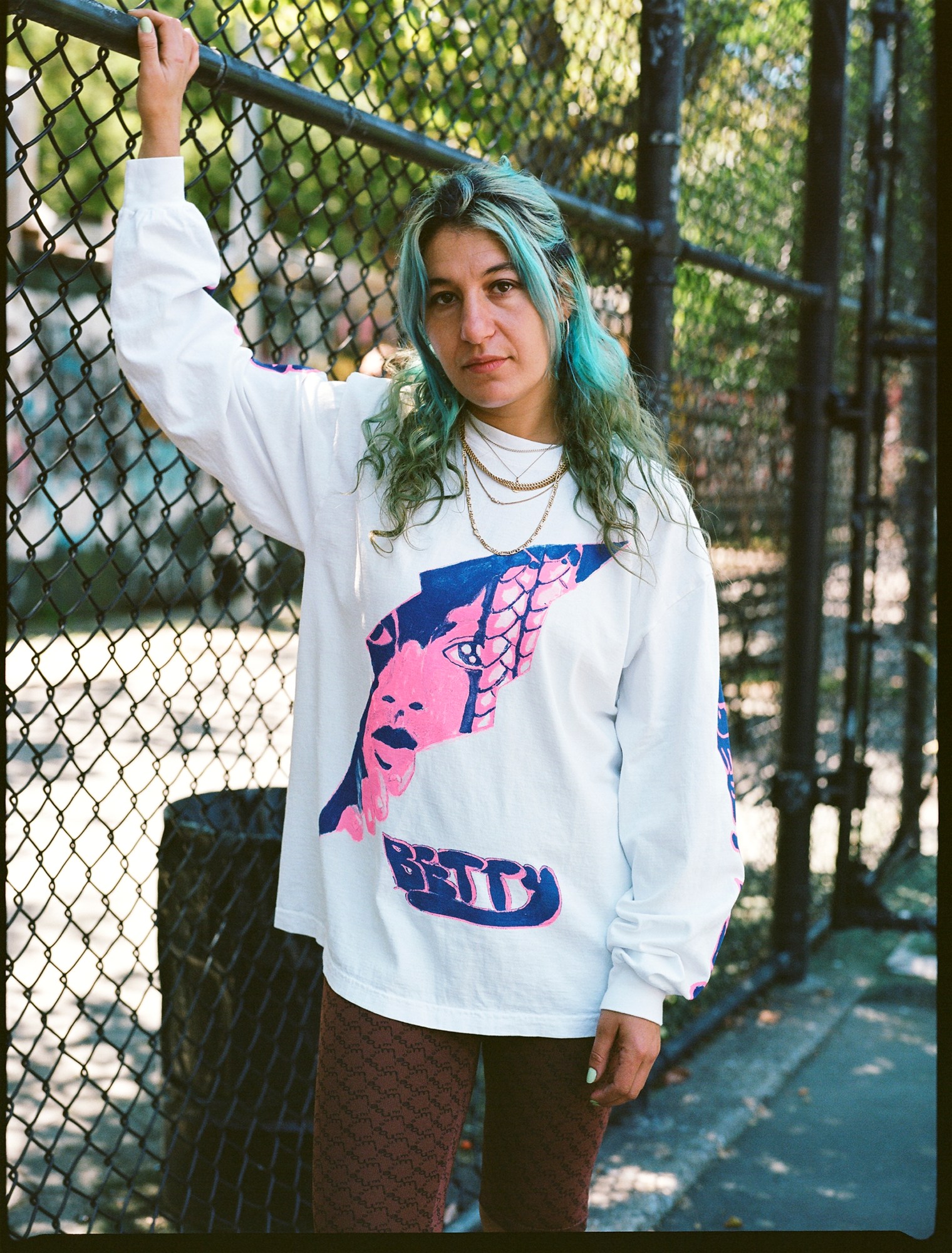
Sonya Sombreuil
Painter and clothing designer of Come Tees
Talk to me about Betty, what do you like about the show? Why does it resonate with you?
I love the themes of coming of age, self exploration, and being a teenager. There is also a lot in there about the self versus community, the self and the city. It’s such a cool show.
What’s your relationship to skateboarding? I know you grew up in Santa Cruz, so you must have been around it a lot? Do you skate?
No, I don’t skate, but I grew up around a ton of skaters and I’ve always been really into the art that surrounds skateboarding. There were so many skate companies around me making incredible stuff when I was a kid, and it’s just such a deep, cool culture that I really appreciate.
Come Tees and Betty did a really cool collab for the first season of Betty. How did that come about?
I’d lent some stuff to the costume department, I think, and they ended up dropping me a line to collaborate on the shirts. The show felt like it fit so perfectly into the Come Tees world, it was such a cool connection. Being from Santa Cruz, obviously skate aesthetics were a part of my origin story, and it all just felt like it fell into place.
How did growing up around the skate community inspire Come Tees? What themes from skating and skaters did you incorporate into your clothing?
I think there’s a kind of grittiness and mystique to skate clothing, and there’s kind of a cult feeling about it. With a lot of the skate brands that I like, they’re really esoteric. It’s a sort of “if you know, you know” kind of feeling about them, and I think that is so cool.
One theme that pops up a lot in Betty is community. What does community mean to you as an artist?
I mean, my community is essential. Arguably, my community is my medium. My community is my primary source. I am inspired by the people around me, I take the vision of those around me very seriously, and I disperse what I do through the people I know.
As somebody who owns her own clothing brand, what’s your personal style like? Can you tell me a little bit about how you use your clothes and your hair, your makeup or whatever as a form of self-expression?
I feel like I’m always kind of trying to become the person that I wanted to be when I was 15 or 16. I’m older now, but I really think my goal for my style is to wear things I was dying to wear, but wouldn’t allow myself to put on back then. I love my Meow capris, I love my Buffalo London high tops. I feel like now I can be exactly who I always wanted to be.
Who are some of your favorite women and non-binary skaters right now?
Definitely Cher from Glue, Cher Strauberry. She’s incredible.
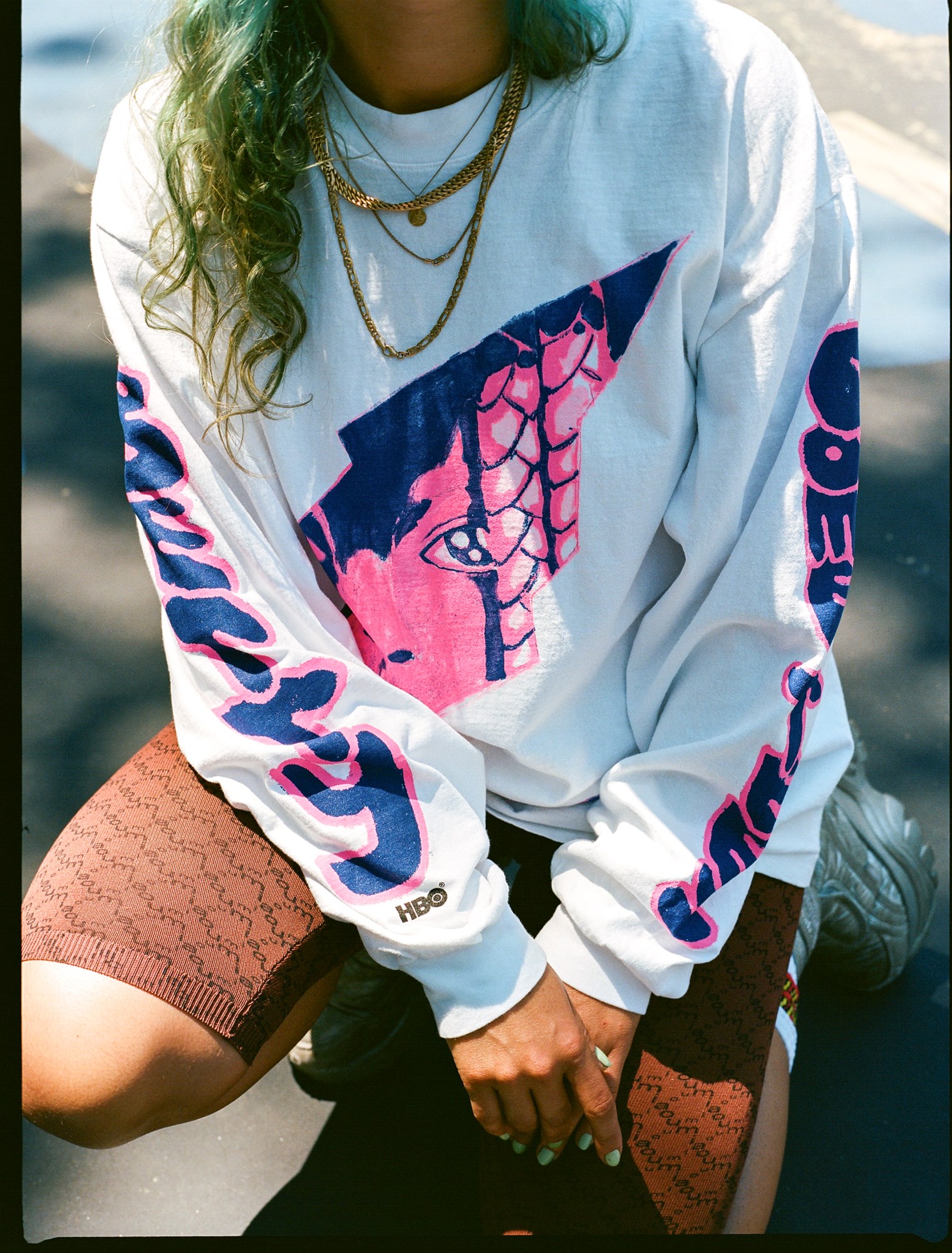
What were you most excited to see in Betty season 2?
I think it’s interesting to see the pandemic depicted. I’ve been wondering how TV was going to deal with that, whether they were going to gloss over it. And so I think that’s really interesting to see a depiction of young people navigating this catastrophic event.
What would you say it is about the ethos of Betty that makes it a perfect fit for Come Tees?
Honestly we’ve talked about this a lot but the themes of community, self expression, exploration and identity, those are the things I’m constantly dealing with in my work. I think when you scratch the surface of anything, a lot of things are about exploring the self.
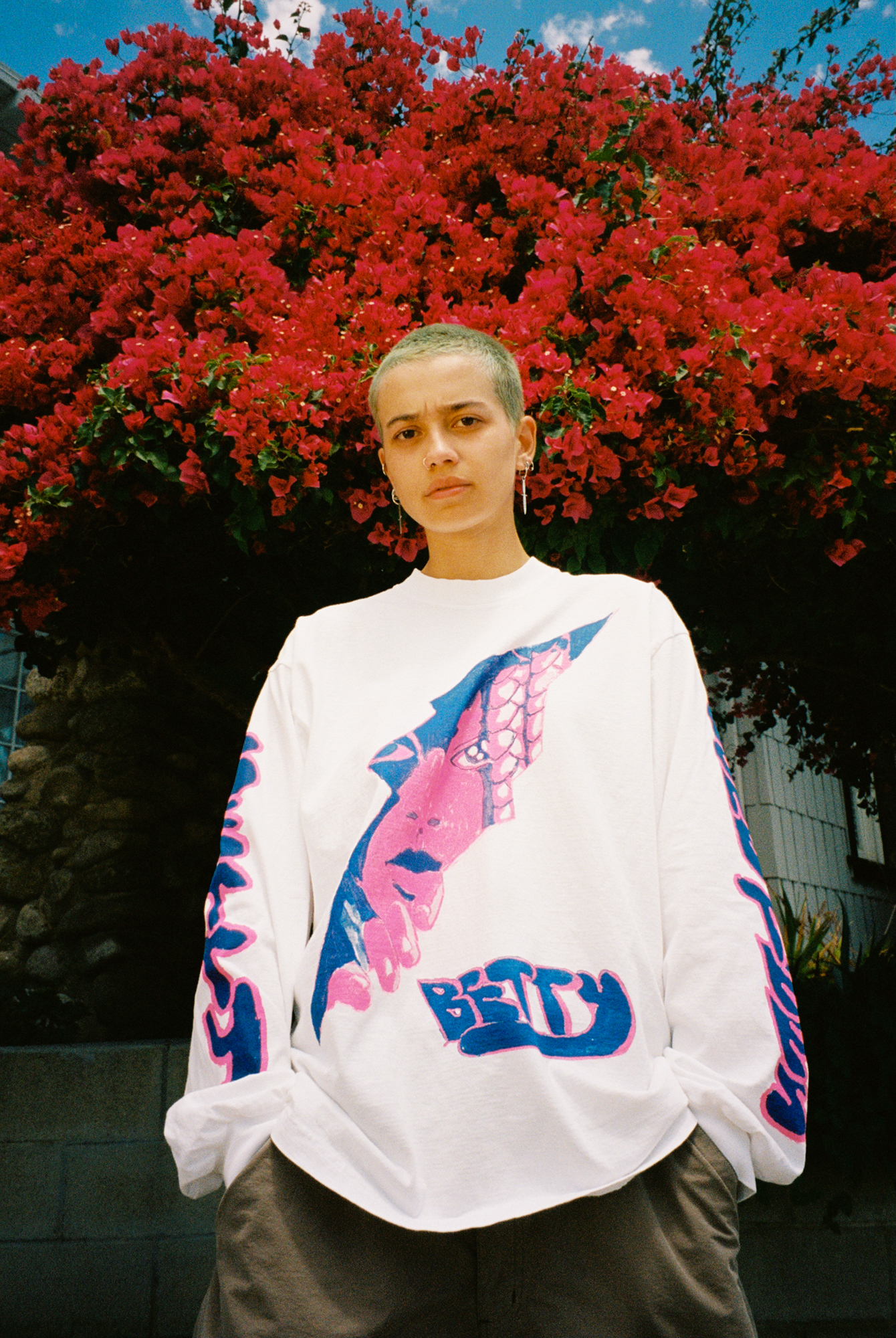
Danielle Melendez
Skateboarder and actress
Your character on the Betty, Paloma, has such an interesting story. You’ve mentioned in the past you were able to conceive of her yourself, and I wonder what parts of her come from you?
Well, I am not a sugar baby, I’ll start with that! But if I was a sugar baby, that would be me. She’s really confident, super flamboyant, loud as hell. She’s Latina, like me, and she’ll never take shit from anyone. She also respects her clients and would never do anything crazy with them. I think Paloma really thrives on respect—being able to take care of people is important to her.
So yeah, there is a bit of me in Paloma—we have the same little New York Latina twang. It’s been really easy for me to get into her mindset because, even though our lives are different, we want the same things—it’s like, “I smoke weed, I love money, I love food and skateboarding.” I can definitely relate to her.
So much of Betty’s second season centers around the theme of personal growth and self discovery. How do you see those themes popping up in your own life?
They pop up too much. I broke my back last year—slipped two discs and tore my sciatica while skateboarding. I really thought my career was over and fell into a full-fledged, serious depression. I had to get an epidural injection in my spine, and I’ve never even given birth. It was rough. At the same time, I lost my old roommate and another friend, and it was hard to handle all that physical, spiritual, and homie loss at once. I mean, you expect to lose people as you get older, but I didn’t expect it to happen the moment I hit 25.
And to be dealing with such a grave injury at the same time, man. I couldn’t do anything for three months, and I really mean that. I couldn’t use the bathroom, couldn’t sneeze, laugh or cough. I spent six months in bed nursed back to health by my cats, who are amazing nurses, and my friends, of course.
It turned out my career wasn’t over, but the lesson I learned from all of that was that I need to be ready to accept whatever life hits me with—be it positive, negative, neutral—I can’t be afraid of the future not turning out how I want it to, I need to be OK with setting aside my expectations.
A lot of people consider this the golden age of girls’ skateboarding and inclusivity in sports in general. How have you seen the sport evolve since you got into it?
It’s funny, like yes I am a woman, my pronouns are she/her, but until recently I don’t think I realized how few women were into skateboarding in the past. Now I think back to when I was 17 and I first started, and it was just me and 30 guys. I do love seeing the diversity in skating now. I was recently out in LA at a queer skate event thrown by my friend Briana King. It was one of the best days of my life, I met so many new people and it was just this beautiful space she created where everyone felt safe being themselves no matter what. It is so rewarding to be a part of this community.
Who are some of your favorite women and nonbinary skaters right now? What about them inspires you?
The New York skaters are all the homies, you know? Briana King is my best friend. Ajani Russell is one of my best friends. I also love Leo Baker. Their personality and overall attitude with skateboarding is amazing, and every time I see them at the skate spot it’s just good vibes all around. They are so friendly and welcoming.

You’re an artist as well as a skater, who are your favorite artists right now who are creating work that encapsulates or imagines community in a way that you can relate to?
Sage Adams, hands down. She is such a creative human being. She gives back to the community through art, skateboarding, lifting up queer voices and making sure everyone feels comfortable. I never see her working as hard for herself as she does for others, and I aspire to do the same. She is probably the most talented, hard working artist I can think of.
What about Betty season 2 were you most excited for people to see?
I think my favorite part of season 2 is how we approach the topic of dating in New York City. Dating in New York is trash. It’s the greatest city in the world, but the shittiest in terms of dating.
Betty explores that this season, and I really like how it’s approached. There’s an episode about transparency and communication within relationships—how can we stop ourselves from saying stupid crap? And how do we own up to it when we do? That’s another theme I love from the show: accountability. I think we as a culture are so focused on canceling people instead of allowing them to acknowledge their faults and move past things. People make mistakes, and they can’t grow from those mistakes if they’re not allowed to. We don’t have to forgive, but we should let people who’ve fucked up take ownership of their actions and evolve. It’s toxic to just cancel someone instead of just addressing what they’ve done, you know?
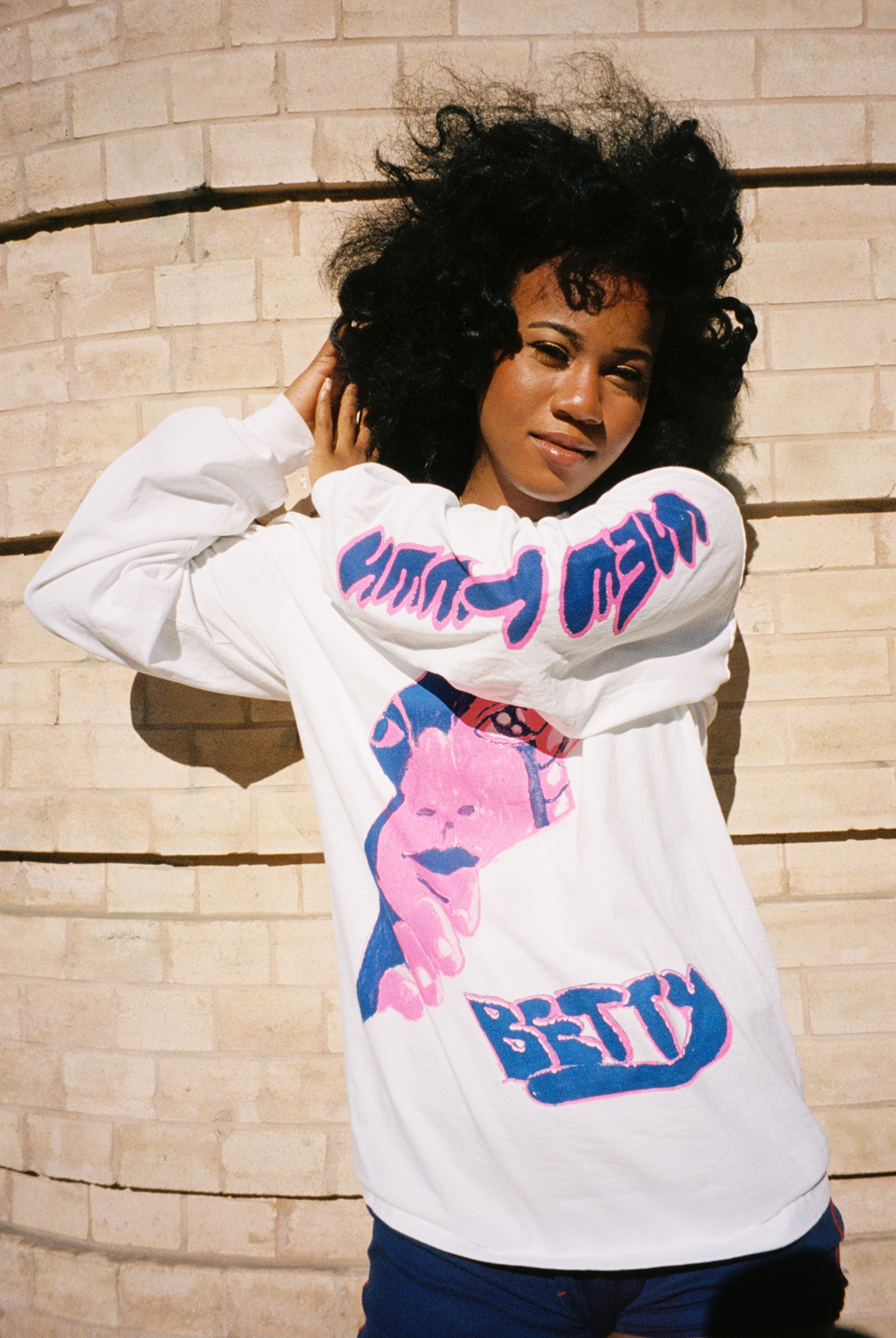
Sage Adams
Artist, curator, photographer, creative director
Tell me about why you like Betty? What about it makes the show resonate with you specifically?
Betty is so reflective of something I didn’t have at all. Obviously there needs to be a bigger conversation that goes beyond representation, but at the same time, as a 10-year-old black femme, I was embarrassed not to be amazing at skateboarding, honestly. I thought because I wasn’t amazing, because I couldn’t do kickflips at 10, that I should stop skateboarding. That it wasn’t something I needed to pursue. For a while, I did stop, and it hurts me to think about that. Little me stopped because I thought, “If I’m gonna be a skater, I need to be the best.”
But the reality is, no one starts out amazing. In order to learn, in order to get good, you have to fall a million times. You have to be embarrassed. You have to get out there and practice a kickflip 10,000 times before you land it. And even if you can’t, that doesn’t mean you’re not a skater. So what I love about Betty is the way they show the different levels of skateboarding that exist. From novice to advanced, they’re all skaters. I really resonate with that aspect of it.
Definitely, like, young white boys are allowed to be bad at skateboarding. They’re allowed to be mediocre.
Right, and that’s not just an industry standard. It’s a life standard, you know? If you’re not a boy, you have to be twice as good. That’s always bothered me. So I like seeing the different levels represented in the show.
One thing that struck me about Betty season 2 is how much the themes of personal development and self discovery come up in every episode. How do you relate to those themes?
The idea of re-evaluating is something that’s been really prevalent in my life over the past few years. I’ve had to take a look at my relationship with work, my values, how I was raised and think about how I’ve internalized those ideas. For so long I’ve totally subscribed to rise and grind culture, and that’s been really interesting for me to try and overcome. Like everything, it’s not something I can get over in one shot. I’ve found myself slipping back into a kind of “work is life” mentality, but the fact that I can recognize it now is progress.
I think that’s the biggest personal change I’ve made recently. Maybe I’m not totally out of grind culture, but at least I can recognize when I’m in a pattern and try to break it. So that’s my current journey—I’m trying not to make my whole life about work, and trying to stop letting work determine my feelings all the time.
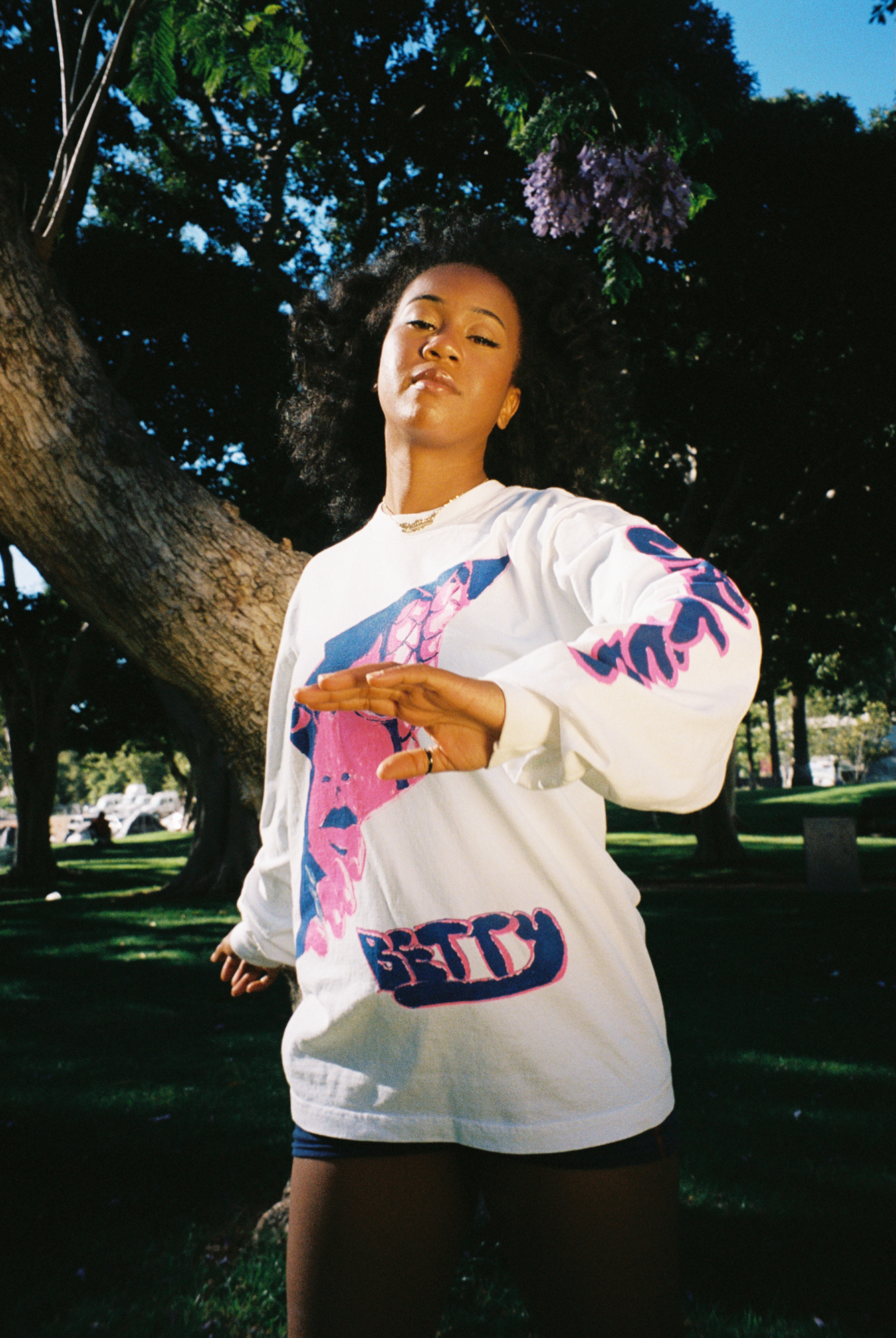
Has the culture of skating changed from when you were a kid, when you felt you needed to be twice as good as the white boys? A lot of people would say today is the golden age of skateboarding for girls, do you feel that way?
You know what? I don’t feel that way. There will be no golden age of girls in skating until we just throw the idea of gender out the window. I don’t think it’s productive to use gender as a way to establish a person’s accomplishments or differences. We’re putting girl skaters on a pedestal and then having to watch grown men get upset about that. I don’t know, there’s still so much that needs to be discussed.
I mean, homophobia, transphobia, bi-phobia, all of these things that occur, especially in the skating community. I’m hesitant to call this a golden age when there’s so much more progress to be made. Like yes, representation is fire, and it’s one of those things that I waited around for, for a really long time, but I want to see beyond that. What’s next? How are we going to have these conversations and change these dynamics so that when grown men see young people skating on TV, they don’t get upset that the sport isn’t catering only to them? There are layers to it, but I definitely feel it’s still kind of difficult to skate when you’re not a man.
Who are some of your favorite women and non-binary skaters who are killing it right now?
Let’s see, Leo Baker’s fire. Rachelle Vinberg too, I’ve always loved her clips. I’ve followed her on Instagram for a long time and really like her style and flow. And then obviously, Beatrice Domond, I’m a huge fan. Her style, the collabs she does, and her recent shoes have been so cool. Briana King and @yaz.so.mean on Instagram, those are two people who have been really welcoming to me in skate spaces, even though I’m not necessarily a frickin’ shredder or anything. I’m more of an artist and a photographer, but I’ve always loved and admired the skate community. Their willingness to take me in, to meet me at parks, to have fun with me, and to do different projects has been really singular. Yaz and Briana King really are the homies.
Community is a central theme in Betty. As an artist, how do you express community through your art? Is that important to you?
Yeah, I think my community has always been largely online. I’m an internet baby. I moved around so much when I was younger, but recently I moved back to my old neighborhood in New York and I feel I’m relearning what it’s like to be a member of a real community. So much of my art has always been working through experiences I had, or wished I had in childhood, and they’re really reflective of where I came from. So to be back here in my old neighborhood in New York, it makes me see my community in a different sense.
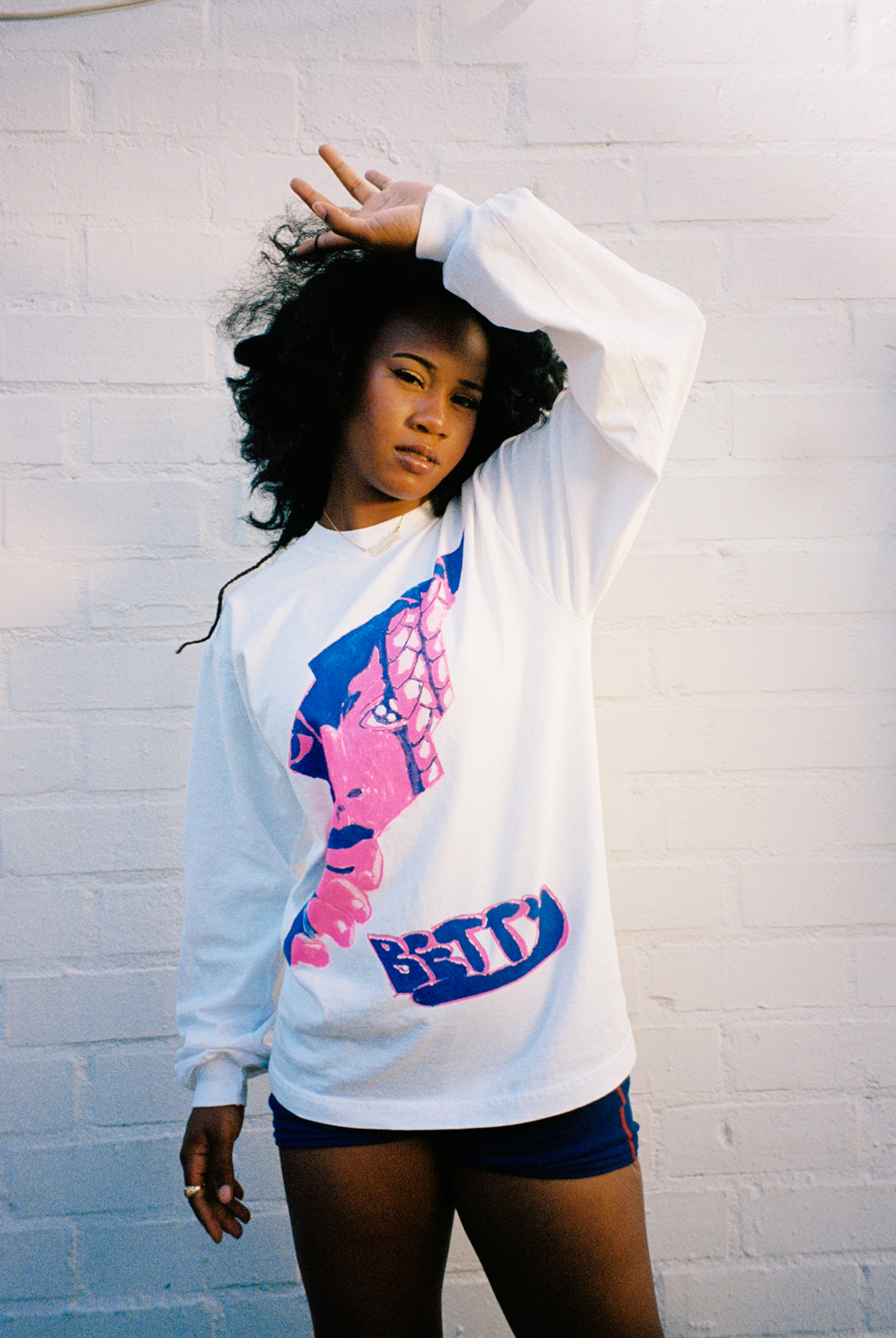
Are there any other artists that you really admire who are making art about community in a way that you relate to?
I could name so many, but I think it would be ineffective for me to name three well-established artists who already have a million followers on Instagram. To me, the people making art that really represents what community means are the people in your family, your friends who are selling their posters for $10 on the street. That is community art, and that’s what’s worth supporting to me. The subway art vendors, everybody with their paintings up in Union Square—they’re putting themselves out there, and buying art from them really means something. I love art, and I think in order to find art that actually represents a community, you need to be open to art that’s not being made by the one percent of artists who make it, right?
Can you tell me a little bit about your personal style and how you use your clothes, your hair, or whatever you put on your body, as kind of a form of self-expression?
I think for me, as a non-binary person, clothes are central to how I feel about my body. I want to be wearing things that make me feel comfortable. For a long time, what made me feel comfortable was wearing hella layers over my whole body so that nobody could tell what I was. But now, I’m trying to lean into wearing what makes me feel good, instead of just hiding myself. That’s been really a cool experience—getting to shed some layers and show some skin and feel comfortable and happy.
This generation is doing really cool things. We’re teaching each other how to express ourselves. There are so many options, and I think I definitely use clothing to express both my gender and my values.
What were you most excited to see happen in Betty season 2?
I’m excited to see Rachelle’s character come into her own sexuality. I really identify with her character because I feel like people used to write me off a lot when I was younger because of the stuff I wore. It gave off a certain asexuality to it. I think it’s cool to show that there’s some nuance in neutrality. Not every girl needs to be perceived as for the boys, or as sexually forward. It’s OK to be sexually neutral. Sex posiitvity is great, but it’s not for everyone.
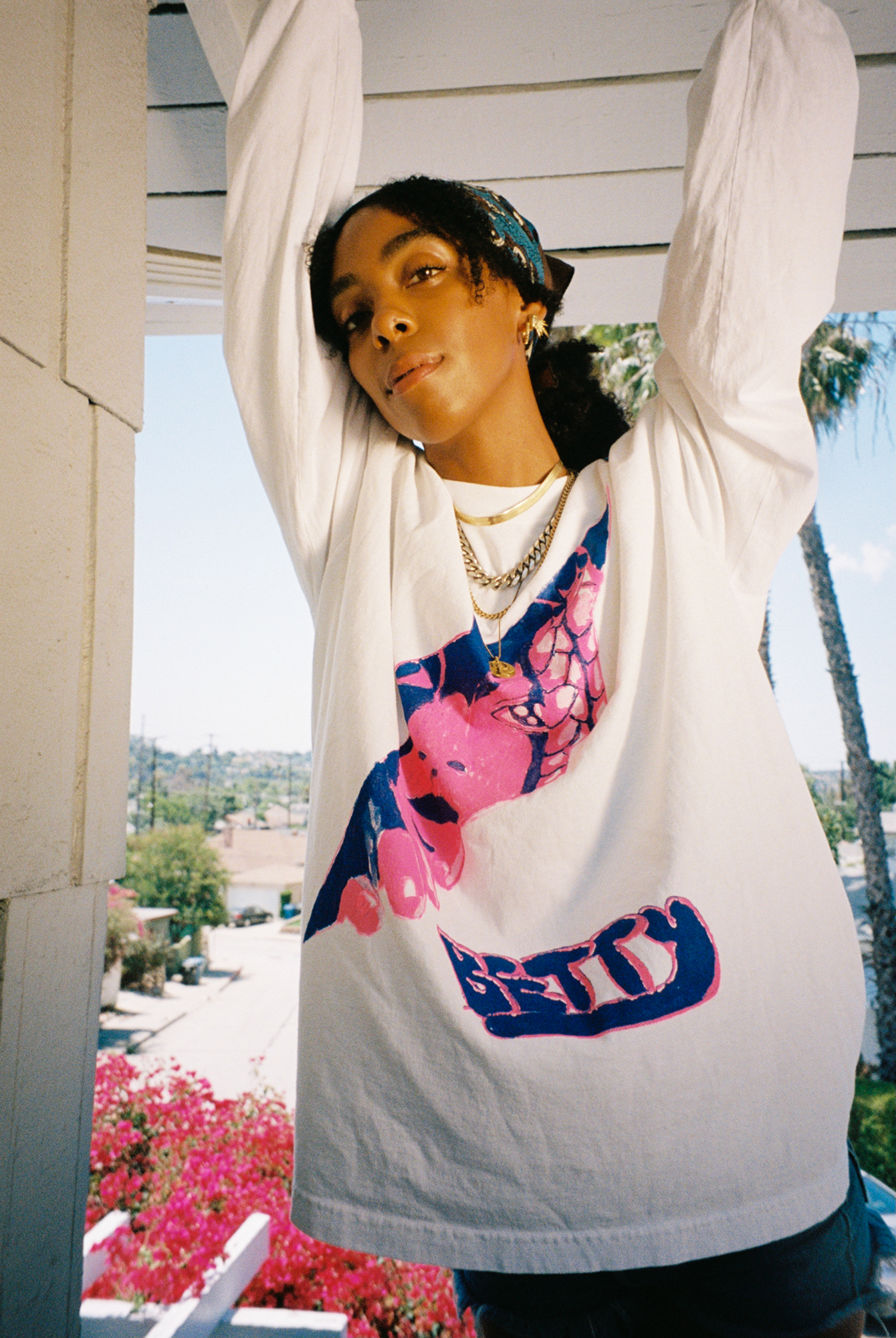
Briana King
Skateboarder, community organizer, model, actress
Tell me about why you love Betty—what about the show resonates most with you?
Everything about the show resonates with me. I mean, everything. I am currently recovering from a broken leg so Nina’s storyline is like, truly what I’m going through right now. We are dealing with the same nonsense.
I just love the show so much. It’s based off real events that happened to all the girls in real life, and me and everyone on the show are actual friends, so what happens on screen really represents things we’ve gone through and done together.
Watching the first few episodes of Betty season 2, the themes of personal growth and self discovery really stood out to me. How are you seeing those themes pop up in your own life?
Dealing with this broken leg has really been eye opening. Before it happened, I don’t think I really valued my friendships as much as I should have. Now it’s like, I get to spend so much time with the people who are special to me, and it feels so nice to know how loved I am. I love the people around me more than I ever knew. So much has changed in my life recently—I got a new agency, a new manager, and I’m getting so much closer with all my friends. All this has inspired me to make a bigger effort to love the people who matter to me harder than ever.
A lot of people would consider right now to be kind of like the golden age of girls skateboarding, and I think you have a lot to do with that. How have you seen the world of skateboarding evolve since you got involved with it?
I think it’s definitely evolved in the sense that more people are becoming open to showing their progression and more open to sharing their interest in skateboarding online. For a long time, when I’d skate with my girls, gays and theys, they’d be like “Oh, I’m just doing this for fun. I don’t want to get a clip, I don’t want to post about skating on Instagram, I’m not serious about this.” I think they were kind of scared of posting about having fun with skateboarding because of how serious the industry was. People they saw in the scene were always going super hard, and I think it was intimidating—they were comparing themselves and coming up short. But I think that’s changing. It makes me so happy to be able to watch all my friends online, having fun with skateboarding. It’s not about being the best.
I think your involvement has really helped to open up the scene. Can you tell me about the skate events you’ve been organizing and what your goal is with those?
For the past three years, I’ve been hosting meetups for people to help them find friends, and give them a safe space to learn skateboarding together. At the beginning, I was kind of a teacher and I’d set up corners for different moves, like, this is the ollie corner, this is the kickflip corner. Each one was for a specific thing.
My last meetup was more about making friends, it was a day specifically for us to talk to each other, find people in our areas who were interested in the same things so we could all link up. There’s a lot of stress around meeting up and making friends, especially in Los Angeles where people are so siloed in their neighborhoods. No one wants to go to the other side of town. So I had everyone go around, say where they were from and their favorite skate park. Everyone swaps numbers and Instagrams so they could link up later. I think this is really important right now, because so many people started learning how to skateboard during lockdown. They’ve been lonely, and they don’t have skater friends, so I wanted to have a day for all the loners to finally come together and find their own little skate crews.
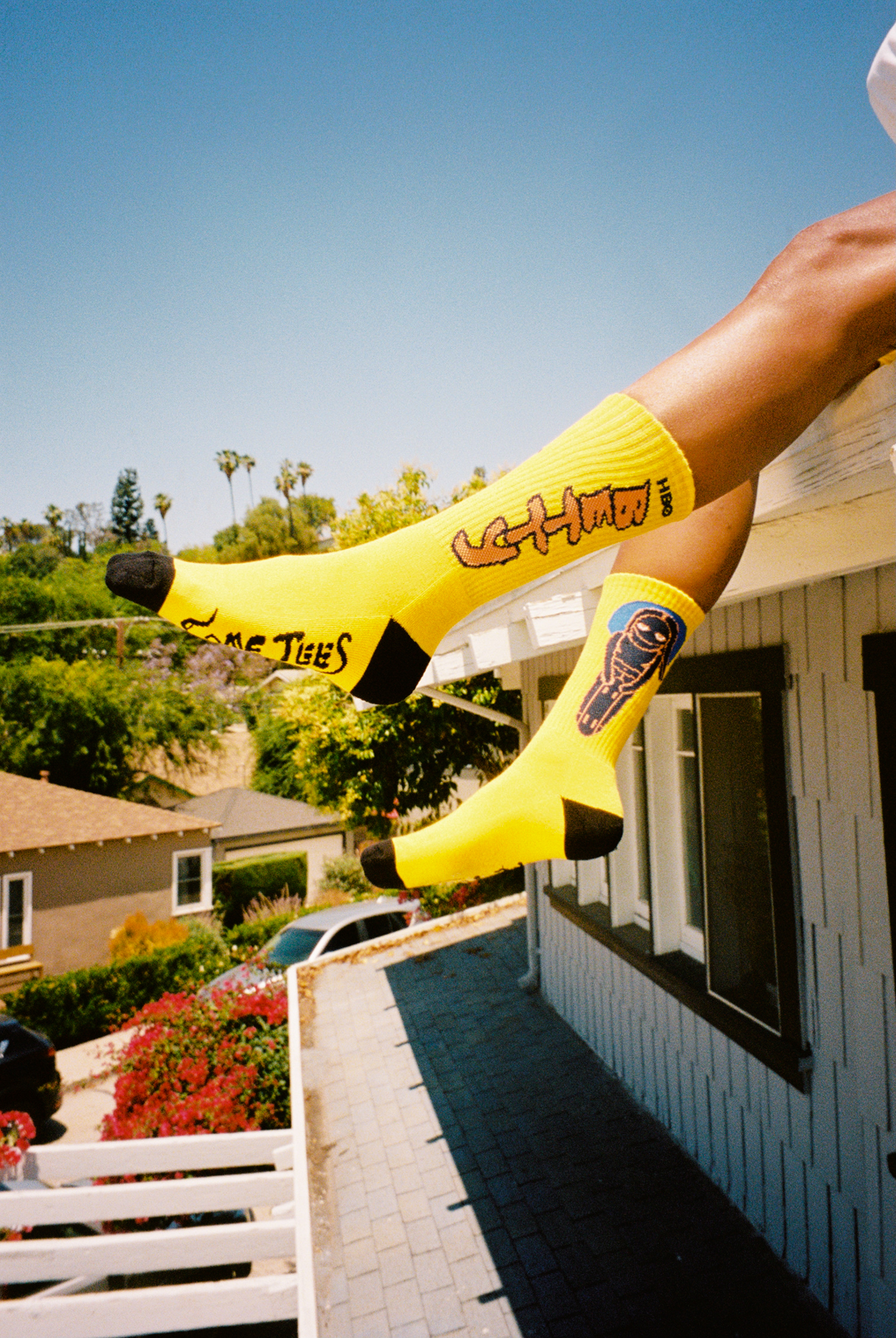
I love that you’re creating a community for so many people. The theme of finding and building community is so present in the show Betty. Who makes up your community?
My community is made up of those girls, gays and theys. Over the past few years of meetups, so many people have been able to come, find friends and feel safe and included. A lot of them don’t even skate anymore, they just come to hang out, and they’ve stayed friends with the people they’ve met here. I’ve seen girls who no longer skate start up poetry groups or whatever, it’s pretty special.
Who are some of your favorite girl, gay, they skaters right now?
Nina [Moran] from the Skate Kitchen is the most inspiring person I know. I met Nina the first year that I started skateboarding, while we were filming the Skate Kitchen movie. We would be outside skating Chelsea Pier, and anyone who’d pass by for even a second she’d pull in.
She’d wave them over and say, “You want to learn how to skateboard? OK, come here tomorrow.” She was just so open and outgoing and free spirited, and it inspired me to be the same way. I always felt that way inside, but I didn’t know how to be that person until I met her.
Can you tell me a little bit about your personal style and how you use it as a form of self-expression? How would you describe your style?
When it comes to skateboarding, I feel like I can wear whatever I want. That’s the moment when I finally feel free. I really am most comfortable and confident on my board. When I’m not on my skateboard I feel like I have to kind of just dull out the rest of my life — I don’t want to be looked at. But when I’m skating, I’m like, let me just go into my closet and wear the most comfortable things that make me feel like who I am.
The next step is trying to figure out how to feel like me all the time. But maybe I don’t have to. It’s kind of fun to switch back and forth like Hannah Montana.
Totally. Your skateboard is your wig.
Exactly, I get on my skateboard and I can be whoever I want.
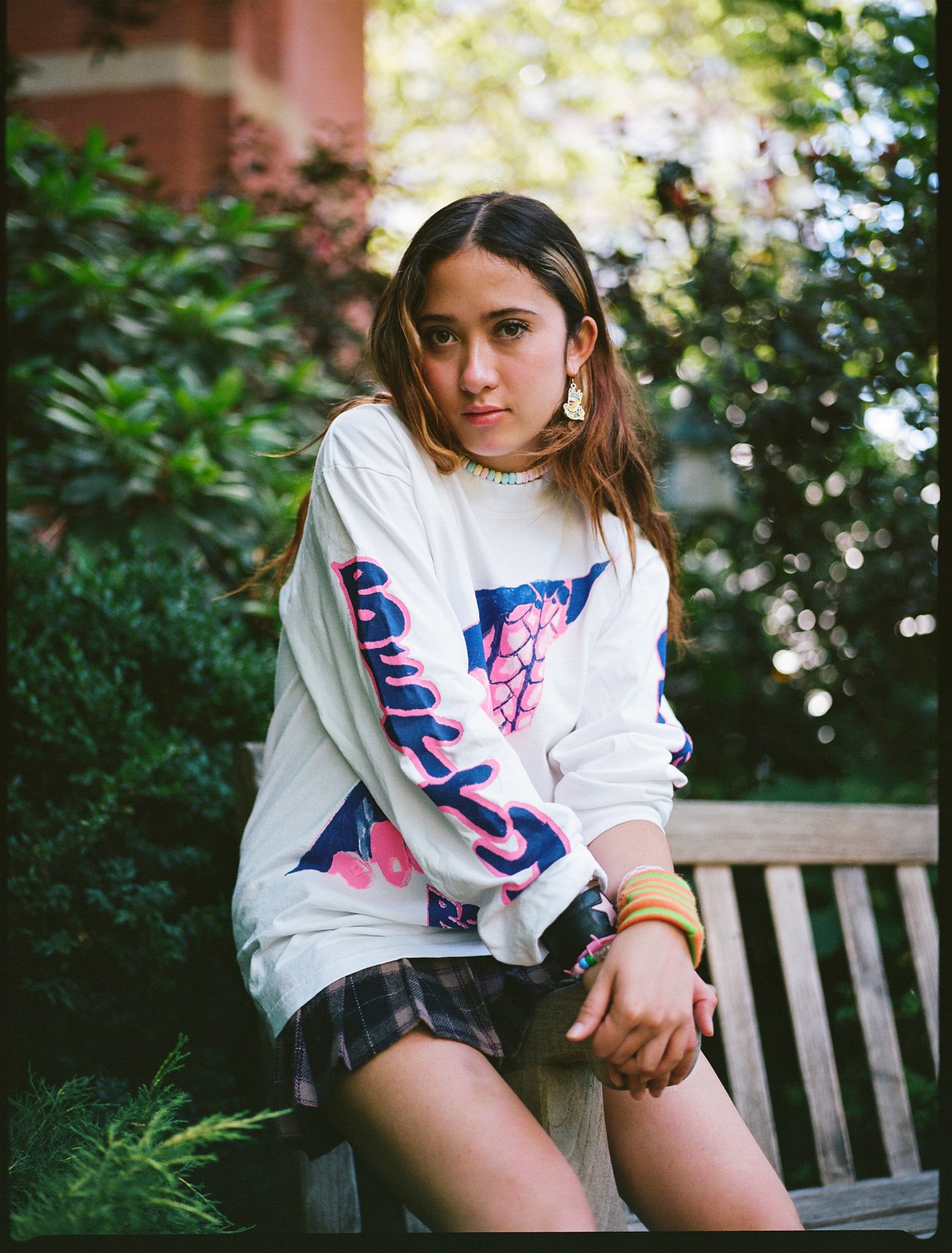
Manon Macasaet
Multi-media artist and videographer
What is your favorite thing about Betty? Why does the show resonate with you so much?
The setting, for sure. The fact that it’s set in downtown New York City really resonates with me, because I’m legitimately in all of these places. I love shows that are set in New York, because you can see the city throughout different time periods and get a sense of what life was like. But this show is set in New York today—physically, the city in Betty is the city where I live. It’s my life. Like, Gossip Girl is a great, maybe exaggerated version of what early 2000s New York was like, but Betty is different. It’s not embellished in the same way. It feels real.
So much of Betty season 2 centers around the theme of personal growth and self-discovery. How do you feel those concepts have touched your life in recent years? Have there been any moments for you where you’ve felt you needed to reevaluate your approach to something?
Right before COVID, I was in Japan. I took a semester off school so I could work out there, and I was really pushing myself on every level. I was feeling super ambitious, but in hindsight, I was being so hard on myself. I had to come back early because of the pandemic, and I was really bummed out about that—I had so many grand plans. I just kept trying to work and juggle so many things, I wanted to prove myself to me, and to my mom. It was too much.
I started getting extremely anxious about the state of the world. I was paralyzed by that anxiety for a while. And then, I was talking with my friend on the phone when it hit me: I have no control over what’s happening. That was the root of the anxiety: I was trying to take control over everything. That realization was freeing. Suddenly, even though it was a really scary, haphazard time, I let go. I decided to stop trying to swim against the current, and instead, just go with the flow and see where it took me. That was a big moment for me.
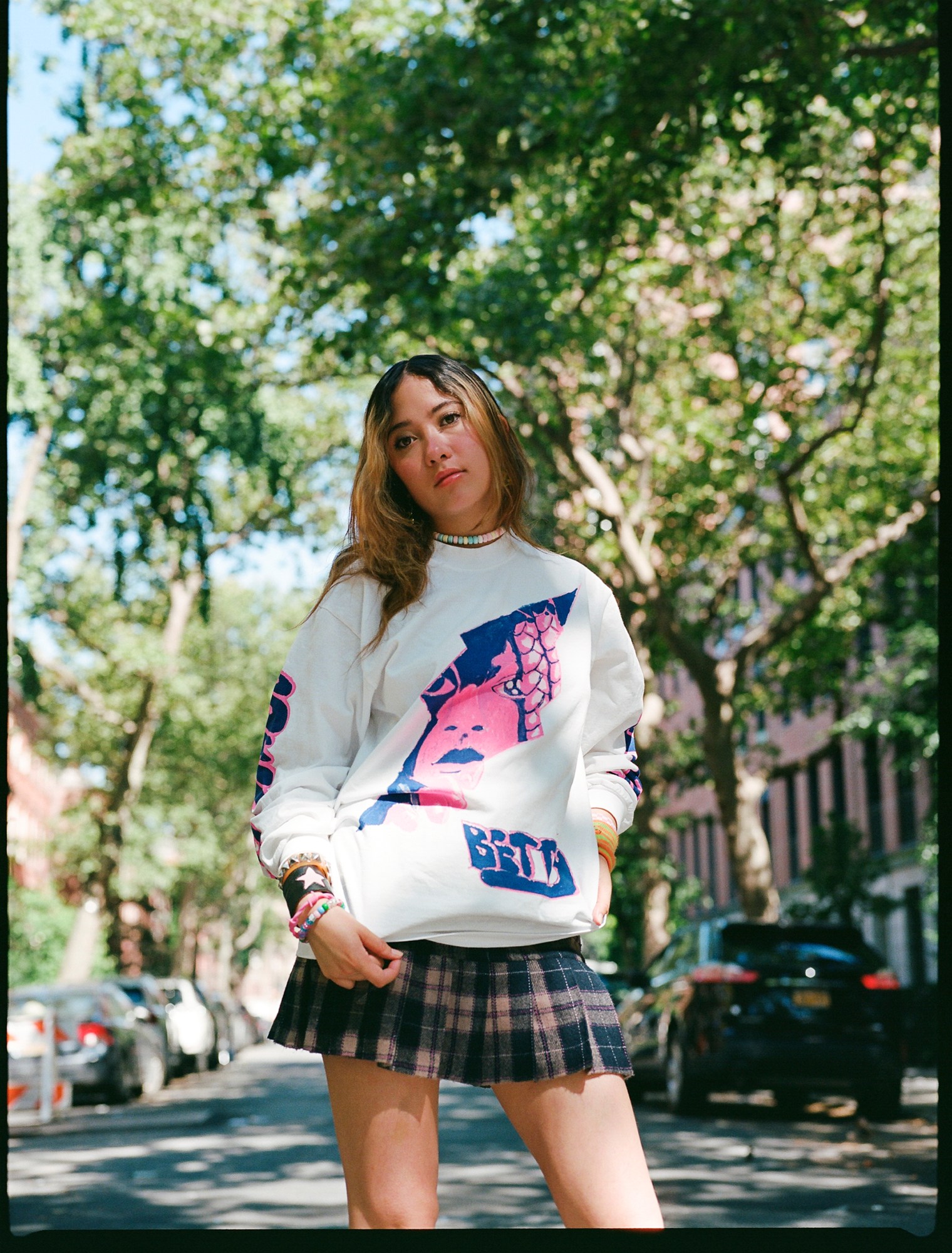
How would you say your life has been enriched by the skating community? Do you think things are changing for the better in terms of representation within skateboarding?
I’ve always had friends that skate—I grew up going to Tompkins [Square, in NYC], I’ve just been surrounded by that world for a long time. I’m definitely seeing things changing, I feel like there are more girls and non-binary people being representated by companies with skate teams today, which is really cool.
At its core, Betty is really a show about community. What is your community like? Why is it important for you to find a sense of belonging?
My community is amazing. We are all really creative and open, we push and inspire each other creatively. That’s what makes me feel like I really belong somewhere—we’re all here, growing together. And we are all so different, but we still support one another. We show up, we do things together, I don’t know, it just feels like family.
As an artist, how do you express community through your art?
I honestly feel like that’s what my art is fully about. During the pandemic, I started working on a personal project which is called called Story of My Fucking Life. It’s kind of a crunk PBS special about my life, and it was a huge team effort. Really, it would be nothing without my friends who make me laugh and offer endless inspiration and guidance. Their work is present in the series, and I wanted it to be a platform for all of us in a way. It’s entirely about community.
Tell me a little bit about your personal style and how you use that as a form of self-expression.
My style is extremely eclectic and funky, which I feel is representative of who I am inside, a very eclectic and funky person. I’m always evolving so nobody can really steal my swag. I like wearing things that tell stories about the places I’ve seen: I collect things from all over the world. I’ll be wearing something I got in Japan alongside a bunch of bracelets I found in Mexico. It’s like, this is who I am, this is where I’ve been.
I love that. What were you most excited to see in Betty season 2?
I was excited to see how the city in the show evolves. New York is changing so much all the time, I just love that Betty does such a good job of recording the landscape of the city. I’m just excited to see how that continues.
Stream Betty season 2 available on HBO Max now.
